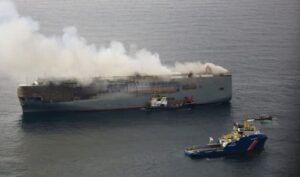The unfolding disaster with the burning car carrier Fremantle Highway off the coast of Amsterdam should give cause for considerations in container shipping as well. With so many lithium iron batteries now being used in electrical products, most significantly inside EV vehicles (electric cars), the increased risk to ships carrying such a product will only go up year on year.
The vessel was carrying almost 4000 cars and close to 500 of those appear to have been electric vehicles. This also means a large number of batteries for which fires are notoriously difficult to deal with even such a fire breaks out on land, let alone on board a ship at sea carrying huge amounts of fuel.
The EU has made a decision that it will no longer be allowed to sell new petrol and diesel cars from 2035. Hence over the next decade, we are likely to see a sharp increase in the shipment of electric cars – and therefore also batteries for electric cars. The risks will go up when transporting this type of product.
Fires on container vessels are already a problem (this has been the case for many years now) and adding large amounts of lithium iron batteries into the mix will only enhance this issue.

Container Lines Already Banning Certain Freight
Some container lines have already banned shipments of a few specific types of dangerous cargo in their containers for safety reasons. The question is whether the same might happen to batteries for electric vehicles – or at least limit it to prevent an excessive amount being on the same vessel, causing a huge fire if there was an electrical fault.
This should also lead to considerations on the part of the manufacturers and importers of electric vehicles.
How will the global supply chain evolve due to these risks now being very prevalent? Potentially this might lead to a development where the majority of these vehicles, and potentially the batteries as well, will be relegated to new types of ‘specialised’ battery transportation vessels, which will be built to withstand a fire breakout on board, should this arise. This alone would create a new segment for ship manufacturers and shipping lines who could operate an entirely new fleet of vessels solely for this purpose.
The use of shipping containers for the transportation of cars has also been seen as a possible solution, instead of using car carriers (what is currently in use eg Fremantle Highway). However, containers do not stop fires, they just help with the prevention of the fire spreading as quickly as it might do when a vehicle is stored in the hold of a giant car carrier, with no preventative methods used.
Something to think about perhaps going forward….




